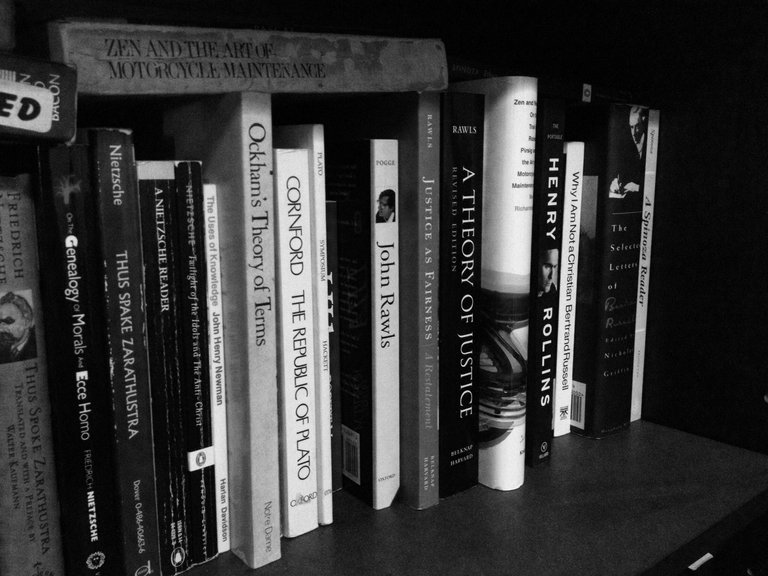
I finished my first short story collection back in 2013. I had revised and edited each piece over and over. And while 13 of the 18 pieces were out for possible publication at a large number of places by the end of that year, "Scaring the Stars into Submission" was ready to be birthed out into the world...assuming anyone wanted to publish it.
They did not. I self-published it at the end of 2016 and I could not have been happier. By the time I published it, 17 of the 18 stories had been picked up for publication by various literary journals or magazines. However, the number of agents and publishing houses that I submitted the manuscript to gave me a false sense of its quality.
Luckily, I've got a couple friends who have already gone through this whole process, so I was able to ask for their advice, which I'll impart here as it's important and will streamline the process for you as well. I think. Since I haven't actually acquired an agent yet (or published anything larger than a 53-page story), this may be more akin to me trying to teach Barry Bonds how to hit a homerun; laughable. But I've found some success in publishing on my own and through various other literary channels.
First and foremost, that manuscript you think is ready to go? You'd better make damn sure it is. That old shampoo commercial gifted out some great advice when they said "you never get a second chance to make a first impression." If your manuscript ain't up to snuff the first time out and it's flat out panned by everyone you submit it to, you're not going to get a second chance to sell it to those same people or those same publishing houses. The likelihood of that happening is pretty infinitesimally small anyway.
So, take a month to go through the whole manuscript again, check for simple grammar errors that spell-check won't pick up on (improper homonyms, etc.), and make sure that you're happy with the final product. If you've got ANY doubts at all, hold off. Your gut is almost always right and waiting another month or a year isn't going to make the work any worse and it's certainly not going to keep you from becoming a successful author (forget the latter even happening; just write your ass off).
Let me take a moment to freak you out and explain to you the enormity of the pond in which you're about to dip your literary toe:
Thanks to the findings at Worldometer, by the time I publish this blog, AT LEAST 1,236,169 new books will have been published.
This year.
By June 24th of 2017.
That's some serious competition you plan on running up against and chances are good you're not going to get hitched to a large publishing house or have a bestseller on your hands (those are hard and dirty facts, so get used to it). By December, that number will be close to 4 million unique books. Yours, should it get published, will simply be one in an ocean of millions, so...good luck with that. Want to feel even worse? Walk into a bookstore and realize, truly realize, how many authors exist underneath that roof whose names you don't even recognize.
Now forget all that. Put those daunting numbers out of your head and focus on your work and your work alone. If it's indeed done and ready to be birthed out onto real page and binding, here's how to start. Or at least how I've gone about it.

There are tons of independent presses that don't require you, the author, to have an agent to deal with them. Chances are good that if you read (and hopefully you do if you call yourself a writer), you've got some books by authors you enjoy that have been put out on some of these smaller imprints. Find the books that you've enjoyed or that have a style similar to yours. See if the corresponding independent press accepts manuscripts or query letters and send out accordingly. The benefit of the more independent presses is that more people are reading them now and they tend to fill certain niches that aren't being filled by the bigger publishing houses. I can think of six or seven presses right off the top of my head whose works I tend to really enjoy and whose books will NEVER end up on the NYT bestseller list.
Another benefit of these independent presses is that they'll almost have a built-in fanbase. This isn't necessarily a guarantee that people will like your book, but like many music labels, people know and come to expect a certain kind of aesthetic from an independent press that's built a good name for itself. If you've liked more than a handful of books from one publisher, chances are good you'll give an unknown author your attention if they're published by the same place. I know I do.
Some presses don't do manuscript readings except through contests. Don't be afraid to enter these and definitely don't hesitate to pay the $15-$30 entry fee. At worst, you're out $15-$30 and you need to submit the manuscript elsewhere. At best, you're out $15-$30, but you've found someone who likes your manuscript enough to publish it. Huzzah!
Supposing you've reached your limit on the independent presses that you're familiar with and all of them have politely declined the manuscript you've bled and sweat tears across for the last year. Well...now it's time to reach out for a little help. Time to find an agent.
There's a pretty fantastic site out there called Agent Query. It's free to sign up, but of course there's the paid option that offers up more access to other parts of the site. The really beneficial thing, however, is that you can search for agents based upon what kinds of writing they deal in.
Do you write "Chick Lit"? There's an agent for that.
Do you write Offbeat/Quirky Lit? There's an agent for that.
Do you write German Oompah-Based Poetry? There's probably not an agent for that, actually, but you get the idea. Pages upon pages upon pages of agent information (Do they accept query letters? Do they accept emailed queries? Where are they based?) are at your disposal. What literary agencies they work for, their email addresses, mailing addresses, whether they specialize in the short story form or novel or non-fiction forms, so on and so forth.
Use this resource; it's fantastic and will, at the very least, put you on a forward-moving path to getting published. You'll have to send out some emails to find the agent that works best for/with you which will take some time, but my friends who have gone through this process explained that potential agents were pretty good about getting back to their queries in a really quick fashion. Having sent out some 50-60 query letters to agents, I can assure you that majority of them will get back to you...just not with the email you were hoping for, so keep your expectations low and your persistence high. Never stop hustling on this front if you're even remotely serious about your book.
And if someone you know tells you not to even bother trying to get signed by any of the big publishers, tell them to open their mouths and then stuff your manuscript down their throat to shut them up. Don't you ever let anyone tell you to not reach for the highest...just make sure you're giving the lowest a chance too. Everyone has to start somewhere and some of my favorite writers created some of my favorite books through small presses or imprints that are now much larger or completely gone.
While I personally stopped looking for an agent (my writing tends to be insanely strange and pretty far out for most), the majority of writers don't write in the same surrealist bent that I do, so their chances of success in finding an agent are far greater than mine. However, with so many of my former grad school classmates having gotten agents AND their books published on some great imprints, I can assure you that much of this advice is solid.

There are endless approaches and various tips for writing, publishing and marketing. With that being said I believe you have brought up some good points and also provided some experiential wisdom.
I will give u a follow and see what else u share.
Best regards~*~
oh there's a whole host of ways to go about it for sure. what i've laid out certainly isn't gospel...more like a good groundwork or skeleton. everyone finds their way through different methods, but i think there are some good points to start from here.
Exactly~*~
Excellent information! I too self published and it has been quite a journey.
All my best I will follow as well and wish you the best. *
That's a lot of new books! Better stand out from the crowd.
Thanks for sharing your personal account and advice for aspiring writers. It took a year off and out of my corporate life and wandering the world to publicly admit that writing is a lifelong passion that I've ignored for too long and I want to find a way to do it full time. Thanks for this.
good for you! it's not often that people figure out what their passion is and then follow it. i would definitely keep your expectations about doing it full time realistic, however. it's pretty difficult for that to become a an actual thing, but good luck!
Yes the warnings are appreciated and the fact that I'm actually a grown up who has lived and struggled in the real world makes me know what you're saying is true. I'm going to give it a go and probably do some consulting to pay the bills. Thanks for the encouragement.